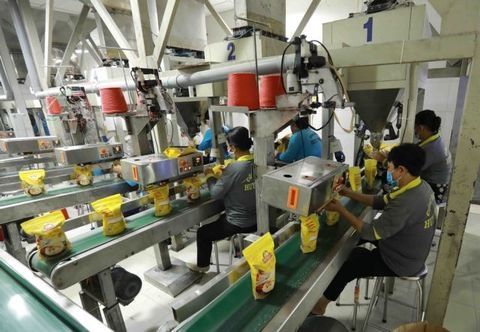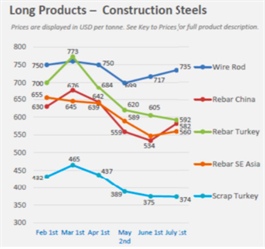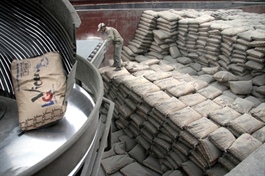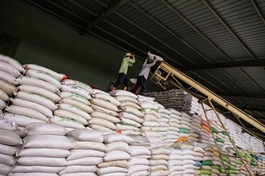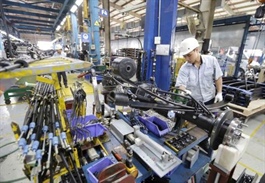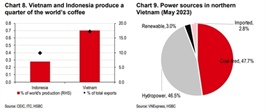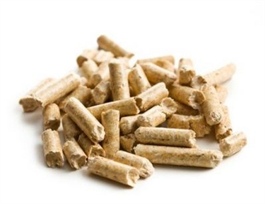Ministry urges producers to ensure food security after India restricts rice exports
Ministry urges producers to ensure food security after India restricts rice exports
The Ministry of Trade and Industry's Import-Export Department urged rice exporters to ensure price stabilisation and food security in the domestic market after India restricted rice exports which is forecast to have a significant impact on the global rice market.
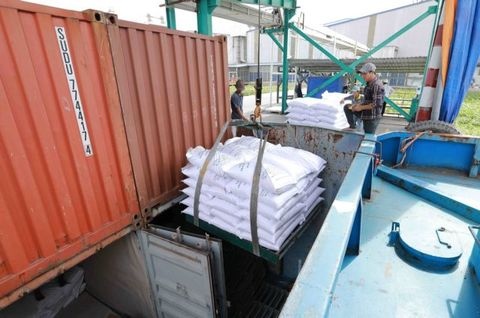
Rice packs loaded for export. Ensuring food security and domestic consumption demand remained the top priority. — VNA/VNS Photo Vũ Sinh |
The ministry advised the Việt Nam Food Association and rice exporters to increase purchases of rice in the domestic market, maintain a minimum reserve for rice circulation and ensure a balance between exports and domestic consumption to stabilise prices.
A close watch must be placed on the domestic and global rice market to raise solutions to cope with problems which might arise from the supply and circulation of rice in the domestic and international markets.
The ministry’s warning came after India’s announcement that it would prohibit the exports of non-basmati white rice, effective immediately from July 20, except for certain cases such as shipments that had already been loaded before the announcement or those approved by the India Government for the purpose of meeting food security needs of certain countries.
The Việt Nam Trade Office in India also issued a warning to Vietnamese rice importers who were importing rice from India to check the status of their deliveries.
According to data from the Indian Ministry of Industry and Trade, Việt Nam imported a record amount of rice from India in May 2023 with a total volume of nearly 101,000 tonnes, an increase of 56.64 per cent compared to May 2022, ranking Việt Nam forth among countries that import rice from India in terms of volume.
In the January to May period, Việt Nam imported 367,500 tonnes of rice from India, an increase of 31.76 per cent over the same period last year. Việt Nam ranked eighth among countries importing rice from India in the period.
The ban, which accounts for more than 40 per cent of world rice exports, aims to curb domestic inflation after retail rice prices climbed 3 per cent in a month because of late but heavy monsoon rains causing damage to crops.
Market insiders said that the ban raised fears of further increases in global food prices but was providing significant opportunities for Việt Nam which were also among the top three rice exporters in the world, together with India and Thailand.
Statistics of the General Department of Customs showed that Việt Nam’s rice exports totalled more than 4.2 million tonnes in the first half of this year, worth US$2.3 billion, an increase of 21 per cent against the same period last year in terms of volume and 32 per cent in term of value.
Given the current market situation, Việt Nam’s rice export goal of 7.2 million tonnes worth more than $4 billion this year was within reach to set a record for the country’s rice export.
Võ Tòng Xuân, an expert in agriculture, said that there was a huge opportunity for Việt Nam to promote rice exports in the second half of this year. The average rice price increased by 11 per cent to reach $539 per tonne in the first half of this year and might reach $600-700.
Đỗ Hà Nam, deputy chairman of the Việt Nam Food Association, said that rice prices would continue to increase in the coming time.
Although Việt Nam was the top three rice exporters in the world, the country must import around one million tonnes of rice on average per year from India for processing.
India’s ban would cause a tense in supply in the Việt Nam market, which would push up prices, Nam said, adding that many types of fragrant rice saw an increase by more than VNĐ8,000 per kg recently.
Still, ensuring food security and domestic consumption demand remained the top priority, Nguyễn Như Cường, director of the Plantation Department under the Ministry of Agriculture and Rural Development, was quoted by Tuổi Trẻ (Youth) newspaper as saying.
Currently, world rice prices are fluctuating around the highest level during the past decade.
Cường said there would not be sudden increases in rice prices in the domestic market as supply remained normal.
The Government and relevant ministries will raise timely measures to ensure food security while not losing export opportunities, he stressed.
He cited statistics that more than 17 million tonnes of rice were harvested as of May, 0.7 per cent higher than the same period last year. Việt Nam expected to harvest 43 million tonnes of rice this year, enough to meet the demand for food, husbandry, processing and reserve and for export of around 6.5 to 6.6 million tonnes.
Cường said that rice exporters should also take into account the scenario in which rice price increases to more than $1,000 per tonne as in 2008 and to have an appropriate business plan, adding that enterprises should be cautious when negotiating and signing contracts when they did not have rice in reserve.







